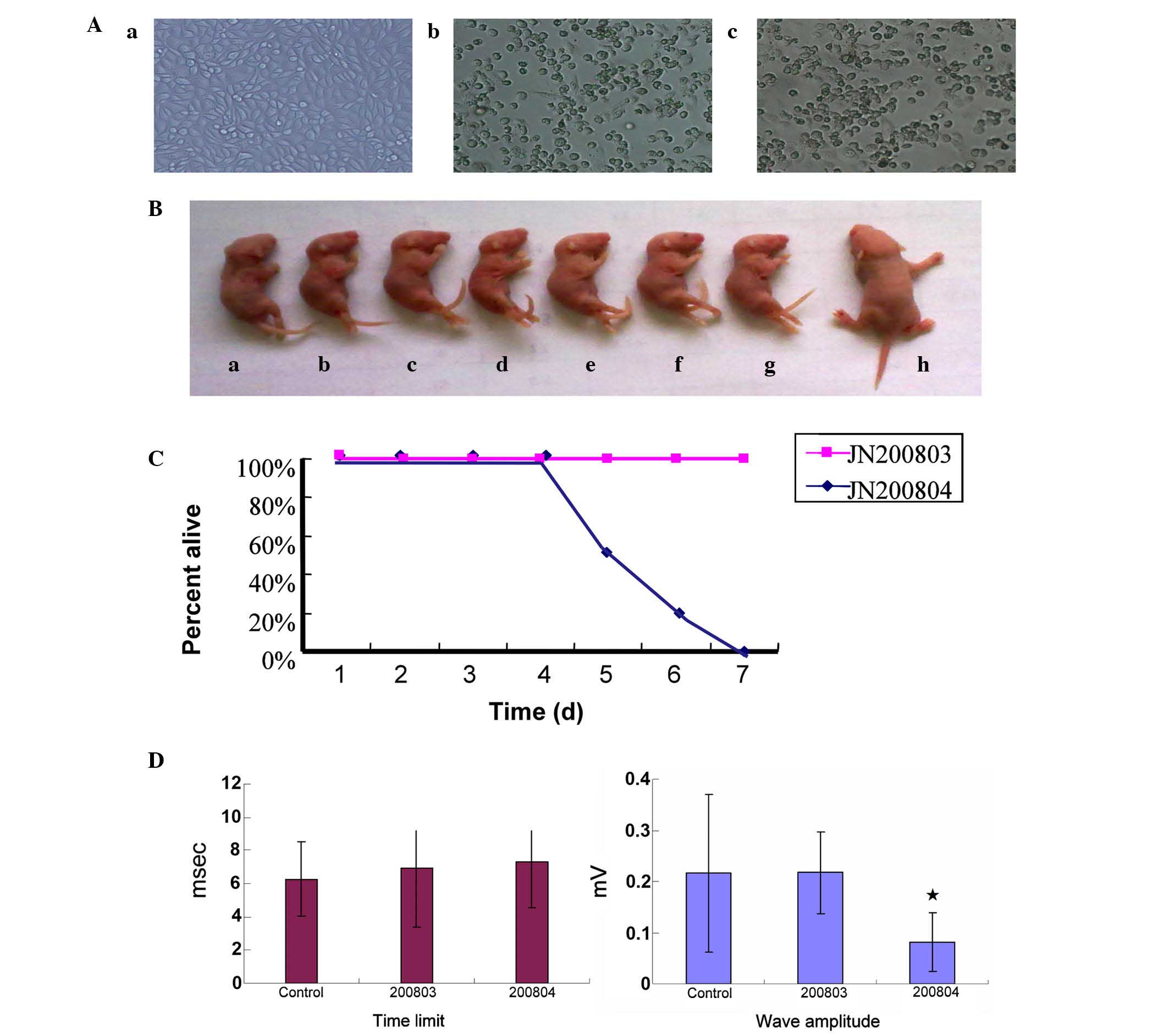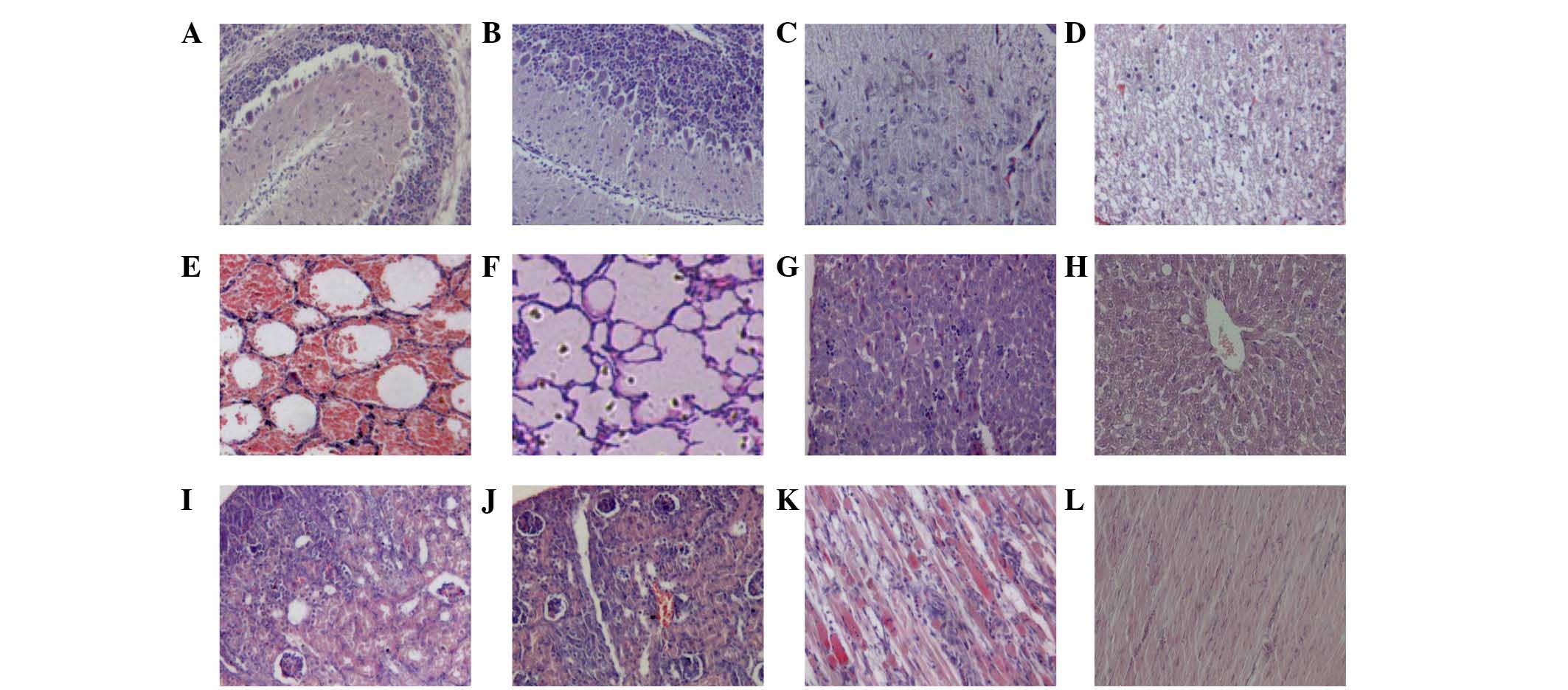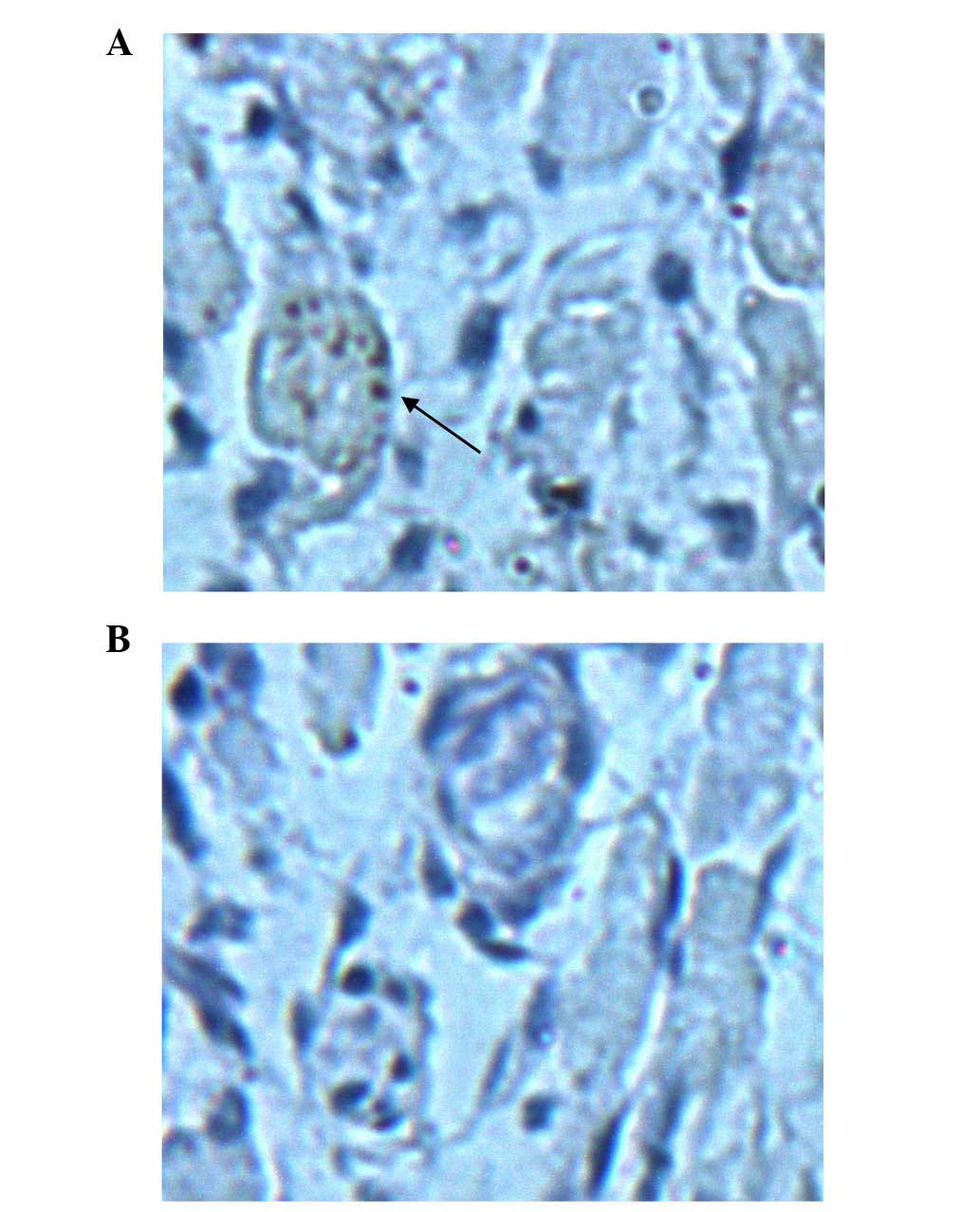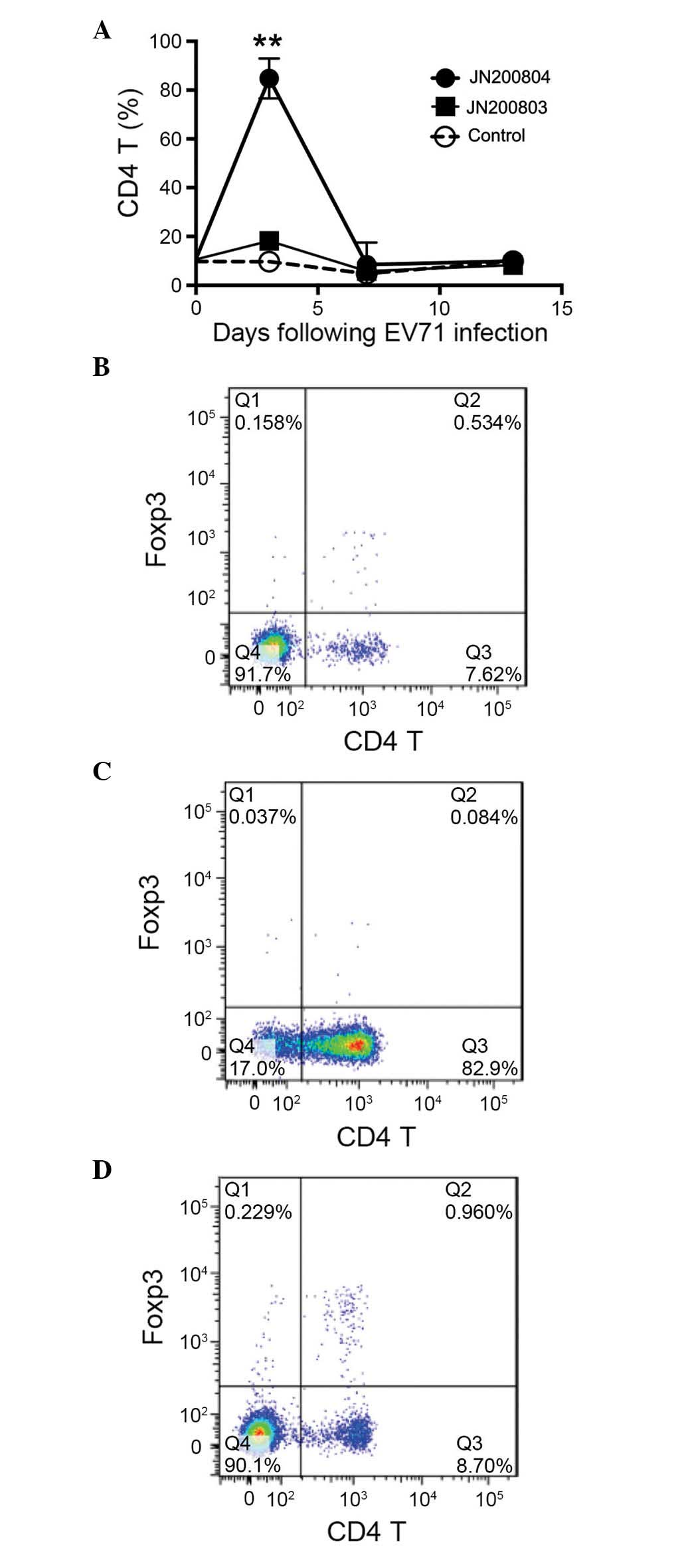|
1
|
Schmidt NJ, Lennette EH and Ho HH: An
apparently new enterovirus isolated from patients with disease of
the central nervous system. J Infect Dis. 129:304–309. 1974.
View Article : Google Scholar : PubMed/NCBI
|
|
2
|
Alexander JP Jr, Baden L, Pallansch MA and
Anderson LJ: Enterovirus 71 infections and neurologic disease -
United States, 1977–1991. J Infect Dis. 169:905–908. 1994.
View Article : Google Scholar : PubMed/NCBI
|
|
3
|
Gilbert GL, Dickson KE, Waters MJ, Kennett
ML, Land SA and Sneddon M: Outbreak of enterovirus 71 infection in
Victoria, Australia, with a high incidence of neurologic
involvement. Pediatr Infect Dis J. 7:484–488. 1988. View Article : Google Scholar : PubMed/NCBI
|
|
4
|
Mizuta K, Aoki Y, Suto A, Ootani K,
Katsushima N, Itagaki T, Ohmi A, Okamoto M, Nishimura H, Matsuzaki
Y, et al: Cross-antigenicity among EV71 strains from different
genogroups isolated in Yamagata, Japan, between 1990 and 2007.
Vaccine. 27. pp. 3153–3158. 2009, View Article : Google Scholar
|
|
5
|
Iwai M, Masaki A, Hasegawa S, Obara M,
Horimoto E, Nakamura K, Tanaka Y, Endo K, Tanaka K, Ueda J, et al:
Genetic changes of coxsackievirus A16 and enterovirus 71 isolated
from hand, foot, and mouth disease patients in Toyama, Japan
between 1981 and 2007. Jpn J Infect Dis. 62:254–259.
2009.PubMed/NCBI
|
|
6
|
da Silva EE, Winkler MT and Pallansch MA:
Role of enterovirus 71 in acute flaccid paralysis after the
eradication of poliovirus in Brazil. Emerg Infect Dis. 2:231–233.
1991. View Article : Google Scholar
|
|
7
|
Chan LG, Parashar UD, Lye MS, Ong FG, Zaki
SR, Alexander JP, Ho KK, Han LL, Pallansch MA, Suleiman AB, et al:
For the Outbreak Study Group: Deaths of children during an outbreak
of hand, foot, and mouth disease in sarawak, malaysia: Clinical and
pathological characteristics of the disease. Clin Infect Dis.
31:678–83. 2000. View
Article : Google Scholar : PubMed/NCBI
|
|
8
|
Chatproedprai S, Theanboonlers A, Korkong
S, Thongmee C, Wananukul S and Poovorawan Y: Clinical and molecular
characterization of hand-foot-and-mouth disease in Thailand,
2008–2009. Jpn J Infect Dis. 63:229–233. 2010.PubMed/NCBI
|
|
9
|
Shah VA, Chong CY, Chan KP, Ng W and Ling
AE: Clinical characteristics of an outbreak of hand, foot and mouth
disease in Singapore. Ann Acad Med Singapore. 32:381–387.
2003.PubMed/NCBI
|
|
10
|
Liu CC, Tseng HW, Wang SM, Wang JR and Su
IJ: An outbreak of enterovirus 71 infection in Taiwan, 1998:
Epidemiologic and clinical manifestations. J Clin Virol. 17:23–30.
2000. View Article : Google Scholar : PubMed/NCBI
|
|
11
|
Sun LM, Zheng HY, Zheng HZ, Guo X, He JF,
Guan DW, Kang M, Liu Z, Ke CW, Li JS, et al: An enterovirus 71
epidemic in Guangdong Province of China, 2008: Epidemiological,
clinical, and virogenic manifestations. Jpn J Infect Dis. 64:13–18.
2011.PubMed/NCBI
|
|
12
|
Tan X, Huang X, Zhu S, Chen H, Yu Q, Wang
H, Huo X, Zhou J, Wu Y, Yan D, et al: The persistent circulation of
enterovirus 71 in People's Republic of China: Causing emerging
nationwide epidemics since 2008. PLoS One. 6:e256622011. View Article : Google Scholar : PubMed/NCBI
|
|
13
|
Chang LY, King CC, Hsu KH, Ning HC, Tsao
KC, Li CC, Huang YC, Shih SR, Chiou ST, Chen PY, et al: Risk
factors of enterovirus 71 infection and associated hand, foot, and
mouth disease/herpangina in children during an epidemic in Taiwan.
Pediatrics. 109:e882002. View Article : Google Scholar : PubMed/NCBI
|
|
14
|
Li CC, Yang MY, Chen RF, Lin TY, Tsao KC,
Ning HC, Liu HC, Lin SF, Yeh WT, Chu YT and Yang KD: Clinical
manifestations and laboratory assessment in an enterovirus 71
outbreak in southern Taiwan. Scand J Infect Dis. 34:104–109. 2002.
View Article : Google Scholar : PubMed/NCBI
|
|
15
|
Chen KT, Chang HL, Wang ST, Cheng YT and
Yang JY: Epidemiologic features of hand-foot-mouth disease and
herpangina caused by enterovirus 71 in Taiwan, 1998–2005.
Pediatrics. 120:e244–e252. 2007. View Article : Google Scholar : PubMed/NCBI
|
|
16
|
Chen C, Wang Y, Shan C, Sun Y, Xu P, Zhou
H, Yang C, Shi PY, Rao Z, Zhang B and Lou Z: Crystal structure of
enterovirus 71 RNA-dependent RNA polymerase complexed with its
protein primer VPg: Implication for a trans mechanism of VPg
uridylylation. J Virol. 87:5755–5768. 2013. View Article : Google Scholar : PubMed/NCBI
|
|
17
|
Lu G, Qi J, Chen Z, Xu X, Gao F, Lin D,
Qian W, Liu H, Jiang H, Yan J and Gao GF: Enterovirus 71 and
coxsackievirus A16 3C proteases: Binding to rupintrivir and their
substrates and anti-hand, foot, and mouth disease virus drug
design. J Virol. 85:10319–10331. 2011. View Article : Google Scholar : PubMed/NCBI
|
|
18
|
Kok CC and Au GG: Novel marker for
recombination in the 3′-untranslated region of members of the
species Human enterovirus A. Arch Virol. 158:765–773. 2013.
View Article : Google Scholar
|
|
19
|
Huang SW, Wang YF, Yu CK, Su IJ and Wang
JR: Mutations in VP2 and VP1 capsid proteins increase infectivity
and mouse lethality of enterovirus 71 by virus binding and RNA
accumulation enhancement. Virology. 422:132–143. 2012. View Article : Google Scholar
|
|
20
|
Cordey S, Petty TJ, Schibler M, Martinez
Y, Gerlach D, van Belle S, Turin L, Zdobnov E, Kaiser L and
Tapparel C: Identification of site-specific adaptations conferring
increased neural cell tropism during human enterovirus 71
infection. PLoS Pathog. 8:e10028262012. View Article : Google Scholar : PubMed/NCBI
|
|
21
|
Yeh MT, Wang SW, Yu CK, Lin KH, Lei HY, Su
IJ and Wang JR: A single nucleotide in stem loop II of
5′-untranslated region contributes to virulence of enterovirus 71
in mice. PLoS One. 6:e270822011. View Article : Google Scholar
|
|
22
|
Penaloza-MacMaster P, Barber DL, Wherry
EJ, Provine NM, Teigler JE, Parenteau L, Blackmore S, Borducchi EN,
Larocca RA, Yates KB, et al: Vaccine-elicited CD4T cells induce
immunopathology after chronic LCMV infection. Science. 347:278–282.
2015. View Article : Google Scholar : PubMed/NCBI
|
|
23
|
Manzke N, Akhmetzyanova I, Hasenkrug KJ,
Trilling M, Zelinskyy G and Dittmer U: CD4+ T cells
develop antiretroviral cytotoxic activity in the absence of
regulatory T cells and CD8+ T cells. J Virol.
87:6306–6313. 2013. View Article : Google Scholar : PubMed/NCBI
|
|
24
|
National Research Council: Guide for the
Care and Use of Laboratory Animals. 7th edition. National Academy
Press; Washington, DC: 1996
|
|
25
|
Cuadras MA, Arias CF and López S:
Rotaviruses induce an early membrane permeabilization of MA104
cells and do not require a low intracellular Ca2+
concentration to initiate their replication cycle. J Virol.
71:9065–9074. 1997.PubMed/NCBI
|
|
26
|
Reed LJ and Muench H: A simple method of
estimating fifty per cent endpoints. Am J Hyg. 27:493–497.
1938.
|
|
27
|
Chua BH, Phuektes P, Sanders SA, Nicholls
PK and McMinn PC: The molecular basis of mouse adaptation by human
enterovirus 71. J Gen Virol. 89:1622–1632. 2008. View Article : Google Scholar : PubMed/NCBI
|
|
28
|
Tamura K, Peterson D, Peterson N, Stecher
G, Nei M and Kumar S: MEGA5: Molecular evolutionary genetics
analysis using maximum likelihood, evolutionary distance, and
maximum parsimony methods. Mol Biol Evol. 28:2731–2739. 2011.
View Article : Google Scholar : PubMed/NCBI
|
|
29
|
Shimizu H, Utama A, Yoshii K, Yoshida H,
Yoneyama T, Sinniah M, Yusof MA, Okuno Y, Okabe N, Shih SR, et al:
Enterovirus 71 from fatal and nonfatal cases of hand, foot and
mouth disease epidemics in Malaysia, Japan and Taiwan in 1997–1998.
Jpn J Infect Dis. 52:12–15. 1999.
|
|
30
|
Shih SR, Ho MS, Lin KH, Wu SL, Chen YT, Wu
CN, Lin TY, Chang LY, Tsao KC, Ning HC, et al: Genetic analysis of
enterovirus 71 isolated from fatal and non-fatal cases of hand,
foot and mouth disease during an epidemic in Taiwan, 1998. Virus
Res. 68:127–136. 2000. View Article : Google Scholar : PubMed/NCBI
|
|
31
|
Nagata N, Shimizu H, Ami Y, Tano Y,
Harashima A, Suzaki Y, Sato Y, Miyamura T, Sata T and Iwasaki T:
Pyramidal and extrapyramidal involvement in experimental infection
of cynomolgus monkeys with enterovirus 71. J Med Virol. 67:207–216.
2002. View Article : Google Scholar : PubMed/NCBI
|
|
32
|
Muehlenbachs A, Bhatnagar J and Zaki SR:
Tissue tropism, pathology and pathogenesis of enterovirus
infection. J Pathol. 235:217–228. 2015. View Article : Google Scholar
|
|
33
|
McMinn P, Lindsay K, Perera D, Chan HM,
Chan KP and Cardosa MJ: Phylogenetic analysis of enterovirus 71
strains isolated during linked epidemics in Malaysia, Singapore,
and Western Australia. J Virol. 75:7732–7738. 2001. View Article : Google Scholar : PubMed/NCBI
|
|
34
|
Thompson SR and Sarnow P: Enterovirus 71
contains a type I IRES element that functions when eukaryotic
initiation factor eIF4G is cleaved. Virology. 315:259–266. 2003.
View Article : Google Scholar : PubMed/NCBI
|
|
35
|
Klinck R, Sprules T and Gehring K:
Structural characterization of three RNA hexanucleotide loops from
the internal ribosome entry site of polioviruses. Nucleic Acids
Res. 25:2129–2137. 1997. View Article : Google Scholar : PubMed/NCBI
|
|
36
|
Huang PN and Shih SR: Update on
enterovirus 71 infection. Curr Opin Virol. 5:98–104. 2014.
View Article : Google Scholar : PubMed/NCBI
|
|
37
|
Yang CH, Li HC, Jiang JG, Hsu CF, Wang YJ,
Lai MJ, Juang YL and Lo SY: Enterovirus type 71 2A protease
functions as a transcriptional activator in yeast. J Biomed Sci.
17:652010. View Article : Google Scholar : PubMed/NCBI
|
|
38
|
Cui S, Wang J, Fan T, Qin B, Guo L, Lei X,
Wang J, Wang M and Jin Q: Crystal structure of human enterovirus 71
3C protease. J Mol Biol. 408:449–461. 2011. View Article : Google Scholar : PubMed/NCBI
|
|
39
|
Shih SR, Chiang C, Chen TC, Wu CN, Hsu JT,
Lee JC, Hwang MJ, Li ML, Chen GW and Ho MS: Mutations at KFRDI and
VGK domains of enterovirus 71 3C protease affect its RNA binding
and proteolytic activities. J Biomed Sci. 11:239–248. 2004.
View Article : Google Scholar : PubMed/NCBI
|
|
40
|
de Jong AS, de Mattia F, Van Dommelen MM,
Lanke K, Melchers WJ, Willems PH and van Kuppeveld FJ: Functional
analysis of picornavirus 2B proteins: Effects on calcium
homeostasis and intracellular protein trafficking. J Virol.
82:3782–3790. 2008. View Article : Google Scholar : PubMed/NCBI
|
|
41
|
Tang WF, Yang SY, Wu BW, Jheng JR, Chen
YL, Shih CH, Lin KH, Lai HC, Tang P and Horng JT: Reticulon 3 binds
the 2C protein of enterovirus 71 and is required for viral
replication. J Biol Chem. 282:5888–5898. 2007. View Article : Google Scholar
|
|
42
|
Choe SS, Dodd DA and Kirkegaard K:
Inhibition of cellular protein secretion by picornaviral 3A
proteins. Virology. 337:18–29. 2005. View Article : Google Scholar : PubMed/NCBI
|


















